#sullivan bioshock
Explore tagged Tumblr posts
Text


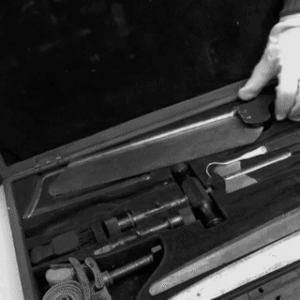


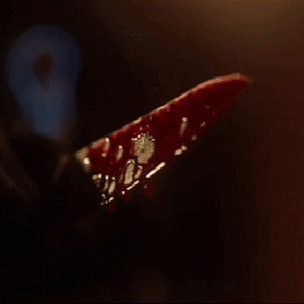

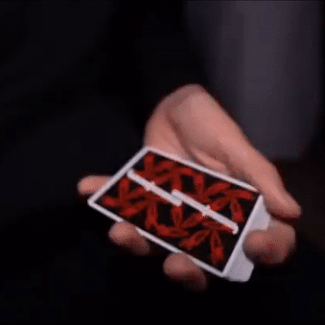
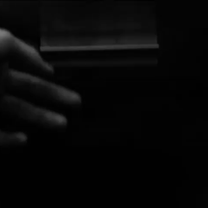
sullivan stimboard for anon :•]
[ID: A 3x3 stimboard.
GIF 1: A black and white view of someone's chest, they're wearing a 3-piece suit and adjusting the tie.
GIF 2: A closeup shot of someone mixing a stack of red poker chips and black poker chips together.
GIF 3: Black and white footage of someone picking up a large saw out of a case.
GIF 4: Close-up footage of someone reloading a pistol.
Image: Sullivan from Bioshock.
GIF 5: A view of a bloody knife, the person who's holding it is out of view but their hands are shaking.
GIF 6: Black and white footage of someone's lower torso, they're wearing a 3-piece suit and adjusting the sleeves.
GIF 7: Someone fanning out a deck of cards with one hand then sliding them back into a stack.
GIF 8: Black and white footage of someone opening a drawer with a variety of tools and sharps, and they pick up a scalpel.
End ID]
#scopostims original boards#tw blood#tw guns#tw knives#cw hands#stim#stimboard#stimblr#stimmy#bioshock#sullivan bioshock#blood#knife#gun#suit#poker chip#poker chips#cards#cardistry#weaponry#weapon
24 notes
·
View notes
Text
Hear me out, the bioshock cast but they are all working in a corporation (Andrew's) and it's a "the office" like romcom/sitcom.
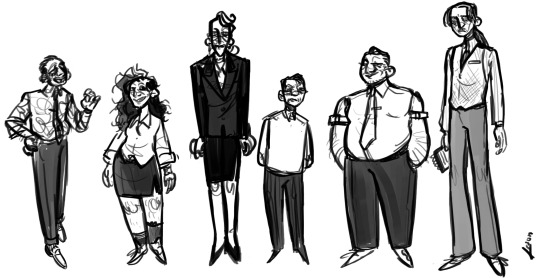
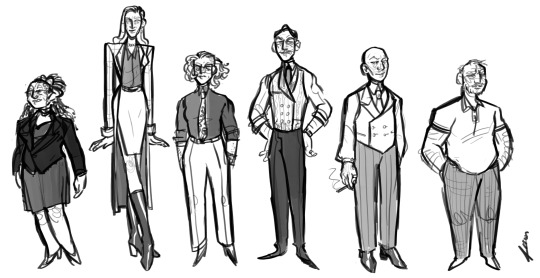
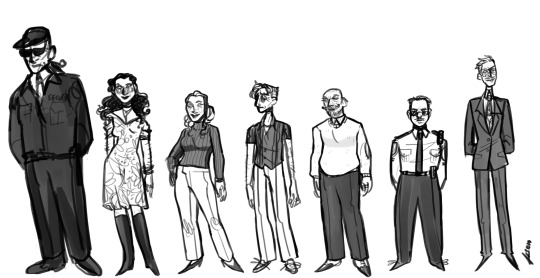

#bioshock#bioshock 2#sander cohen#brigid tenenbaum#sofia lamb#yi suchong#augustus sinclair#gilbert alexander#grace holloway#jasmine jolene#julie langford#andrew ryan#frank fontaine#bill mcdonagh#johnny topside#anna culpepper#diane mcclintock#stanley poole#simon wales#sullivan#dr steinman#martin finnegan#hector rodriguez#silas cobb#kyle fitzpatrick#reed wahl#charles milton porter#jack wynand#eleanor lamb
266 notes
·
View notes
Link
Chapters: 1/? Fandom: BioShock 1 & 2 (Video Games) Rating: Mature Warnings: Graphic Depictions Of Violence Relationships: Frank Fontaine & Jack Characters: Jack (BioShock), Frank Fontaine, Atlas (BioShock), Andrew Ryan, Brigid Tenenbaum, Sofia Lamb, Diane McClintock, Jasmine Jolene, Augustus Sinclair, Sullivan (BioShock), Yi Suchong, Eleanor Lamb, Subject Delta (BioShock), Gilbert Alexander, Little Sister (BioShock), Big Daddy (BioShock) Additional Tags: Alternate Universe - Canon Divergence, What-If, Little Brother Jack, Human Experimentation, Canonical Child Abuse, Karma - Freeform, Slow To Update Summary:
When the inevitable raid through Ryan's men comes earlier than expected, Fontaine is forced to become Atlas earlier than planned and Project Would You Kindly is discovered while Jack is still young. Things escalate when Tenenbaum and Suchong, unwilling to reveal Jack's identity, are forced to turn him into Rapture's first functional Little Brother. To win against Ryan and take over, Fontaine will do almost anything to get the boy back. But what can one man do when karma catches up to him?
#bioshock#bioshock 2#bioshock au#jack ryan#jack wynand#frank fontaine#bioshock atlas#brigid tenenbaum#yi suchong#andrew ryan#sullivan#little brother jack
19 notes
·
View notes
Text
It legitimately makes feel crazy how Culpepper exists only to prop up the male characters. She has one speaking line, and then every other comment on her existence is men insulting and killing her. Her death isn't about herself--it's to highlight Ryan's hypocrisy, Cohen's thin skin, and Sullivan's, her murder's, grief.
Maddening that we're supposed to feel bad for the cop who killed Culpepper, and then stole from his victim's home, and sympathize with his sadness instead of focusing on Culpepper's actual death. Her death isn't hers, more focus is given to the men in her story than her own thoughts and feelings. She doesn't exist outside of men, she doesn't even exist for herself. Her relationship with Jasmine isn't even in the game, it's something added in the book and even there, their relationship is only explored in male characters talking about them behind their backs. Never on screen interactions.
She's not a character in the story, she's a prop for the rest of the male cast, and this can be said for a majority of the female characters in BioShock.
#bioshock#anna culpepper#sigh 😔✌️#i have to keep this limited to just one character or i'll rant about how little jasmine gets to say in the story.#with a writer more nuanced i'd say its almost an intentional representation of how sex workers are silenced#or how julie is the only NPC running a level to get killed at the start.#😔😔😔#cardboard cutouts
85 notes
·
View notes
Text
Reading BioShock: Rapture (Part 6: Frank Fontaine: Funny He-He Clown Man)
<- Part 5: Three Old Men Jerking Their Milk Sticks || Back to the Beginning || Part 7: Shadow Eve ->
By Chapter 2, Shirley finally introduces a few antagonists—Fontaine, as well as G-men doing the world’s worst surveillance.
If you’re hoping for tension,
stop.
hope is a lie and this book is its grave
I Would Like to Feel Anything Please
This chapter opens on Sullivan trying to shake a G-man and failing. Apparently it doesn’t matter because he goes ahead and meets with a character called Ruben Greavy, head engineer for the Wales brothers. I’m assuming that Greavy was originally the city designer before Wales & Wales had to be worked in.
I was most interested in the G-man because I keep looking for antagonists. Ryan has a goal, right? In literally any story anywhere, there would be obstacles the protag has to overcome. One might reasonably conclude that government institutions are Andrew Ryan’s greatest foes. They have the power to stop him through legislation and force: it doesn’t matter how much money you have if your enemy can mobilize the fucking Army.
Who else has the power to stop Ryan? Probably other industry tycoons. In Ayn Rand’s fiction, company presidents commonly ally with each other and the government to stymie the goals of her Ubermensch.
Although present, Fontaine is a small-time crook and motivated in other directions and is thus a non-issue.
As it turns out, I shouldn’t have been excited to see the G-men. After info-dumping a thousand things we either already know or could read in more interesting ways, Sullivan says this:
“Maybe they’ll get a warrant after all. I don’t think they’d find anything illegal.”
So you’re saying there’s no threat.
We are in Chapter 2, on page thirty-fucking-nine, and THERE ARE STILL NO STAKES.
But Preferably Not Indignation
At this point, it’s not about not knowing who Ryan’s enemies are. Functionally, I don’t think they exist. While Shirley invokes entire government institutions, like the FBI or IRS, they literally have nothing to do and no reason to be there.
Moreover, the Olympian—Ryan’s yacht—is namedropped. Which is when I realized that it was being used as a cargo ship.
Wait a fucking minute.
Look, I don’t know shit about boats, but can you really use a yacht like that? Like to ship big ol city parts? Why would you do that? I mean there’s a certain poetic quality in, say, stripping the guts out of your pleasure yacht to bend it to base labor, but we all know Shirley didn’t think that far.
(grumbles to self. angrily notates “research midcentury yacht models and cargo ships”)
Salty — Today at 10:22 AM No, yachts can’t be used like that watchword — Today at 10:23 AM "I found this out in 1 minute Shirley" thank you I figured the design mattered Salty — Today at 10:23 AM It does You’d need some kind of crane to lower things into the water and there’s no way a yacht could take that shit without being built not like a yacht
So it turns out that Andrew Ryan has sent his chief of security personally down to the docks to confirm the time it leaves like he’s some kind of little messenger drone. Somewhere in the proceeding info-dump, Sullivan tells Greavy to leave with all of the building supplies in his ship as soon as possible in case the G-men want to raid them, even though there’s nothing illegal going on. Their reasoning is that they don’t want the US government to learn even a scrap of information about what they’re doing.
Or what? What would they fucking do? There are no laws about shipping out giant city parts. I suppose it could be framed as Ryan being paranoid, but Shirley always explains what characters are doing to the nth degree, and there’s no such explanation here.
Also, and I don’t know why this isn’t being used: the world was fucking flattened after World War II. Shipping building supplies makes a lot of fucking sense. Just tell the gubmint that you’re selling them to France or something. “Aw, yeah, Uncle Sam. You know how much the French like glass tubes. Gonna put all the filthy tourists in there like hamsters so they don’t touch anything. When you get troublemakers you just close the bulkheads and fill them with water.”
Besides, all you have to do is tell the gubmint what you’re shipping off with. It’s for records to be checked against the port that receives the shipment to make sure there’s no funny business. What I don’t remember is if you have to declare what port you’re going to—I suspect that would be the case—but I mean. LIE? This is your life’s work. LIE.
Finally, New York is one of the busiest and biggest ports in the nation. Why would anyone be looking that closely at one more cargo ship? Paperwork back then was even more annoying and difficult to grok than it is today. Imagine the volume for a port like New York’s.
Just fucking LIE.
The real point of this scene is so there can be an exposition dump. Shirley couldn’t just send a messenger who didn’t know what was going on—he needed two people who were In the Know. The important part isn’t entertainment, it’s information: unnecessary and uninteresting exposition about Rapture’s political and economic goals, why they’re shipping supplies the way they are, and the US government, all despite the characters involved being intimately knowledgeable of the situation. Also, they’re about 75% through with the entire escapade, so if this conversation ever occurred at all, you’d think it would be months in the past. The G-man is an attempt at escalation, but then Shirley immediately de-escalates by saying he’s powerless.
So, just to reiterate:
Sullivan tries to shake a tail, fails, and doesn’t care because it doesn’t matter. He shows up at a ship containing building materials for Rapture, meets Greavy, and they lecture each other back and forth about subjects they should already know to summarize a bunch of events we should have seen. As an afterthought, Sullivan tells Greavy he showed up in person to confirm the time the ship leaves instead of calling because the phones are probably tapped. Sullivan will leave before the ship leaves so he won’t actually know the time to confirm with his boss. This particular ship is one of multiple ships and represents only one of multiple shipments—there’s nothing remarkably special about it. They’re not in any danger in any way and there’s nothing the USA can do legally to stop them. End scene.
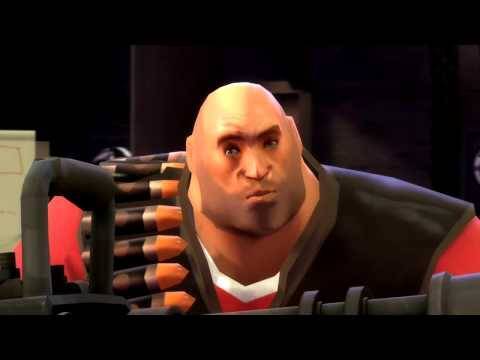
How the hell is anything this bad.
How.
There should really be like twenty chapters for every one of BioShock: Rapture’s, each explaining how we got here. Because instead of sharing the exciting cat-and-mouse shit, Shirley writes about the outcomes where everything is settled.
This is how our reflections write in the mirror universe.
I have read fanfiction by fans of every age and fluency level and ability. Most of it was trash, but it could be excused because they were young or new or amateur writers, and even then, they’re often excited about a concept and trying really hard and might have some neat thoughts to share.
This… this is on a whole different level.
Writing Is Hard (and Caring Is Harder)
The reason for this is, of course, that Shirley would have had to research several different subjects to write about them in any depth, and time was of the essence. In fact, I am now 100% convinced that everything here is done in a mad effort to save effort, which sounds as delightful as it is.
The elements he thinks to research are absurd. I am now sure that he doesn’t know how to rank research subjects by importance. He does not research, say, the histories of the IRS or the FBI or corporate espionage. No, he researches “how to install a toilet” and “historical boxing.” He’s most often focused on physical processes or what things look like—not on what people do or why they do them.
I have a new bet for you: that each chapter will be like a little push-pin in a plot point. None of them will be married meaningfully to any of the other plot points. They will be little islands in time and rely on the reader to insert connective tissue. This will essentially be a disjointed short story collection, except without any tension whatsoever, because they’re just summaries of larger stories that we never see.
Shrug
Let’s contrast this burning sludge puddle with a different burning sludge puddle: Ayn Rand’s Atlas Shrugged. This is a fitting contrast as Rapture is a callback to Galt’s Gulch.
The protagonist, Dagny Taggart, discovers Galt’s Gulch (libertarian paradise and Aryan summer camp) in Part 3, roughly 60% through the book. In my paperback, Part 3 begins on page 643, and the story ends on page 1,069 (nice). The font is like 6 points. I can’t stress enough how dense this book is.
Rand spends ungodly amounts of time and detail lingering on her enemies—politicians and company presidents and whiny family members. She waxes eloquent on the destructive side of selflessness. Over the course of an eternity, she displays in slow, evolving detail how that world fucks her characters over, despite all their best efforts. And oh—they struggle. They fight!
When Dagny ends up in Galt’s Gulch, staring straight into the face of Objectivist Jesus, she has been through hell, and it feels like a relief: like she’s finally free.
Galt’s Gulch was not a given—it was a process.
Rapture deserves the same build-up. The build-up is the story, you understand?
BioShock: Rapture is like a romance novel that skips all its character building and sex sequences to leap straight into post-coital snuggling. It’s not half as interesting or meaningful if you don’t include all of the pining and rage and frustration and explicit dicking.
Funny He-He Clown Man
Oh, Frank Fontaine. They done did u dirty.
Hey, hypothetical reader, I’m gonna ask you something: what do you think when you hear "Frank Fontaine"? Do you think of a funny little clown man who changes into costumes every ten seconds like a malicious Bugs Bunny? Because that’s what we have here. And, like everything else in this shapeless abortion, I hate it.
Generally, when I write a character who’s not my own, I say: “What is most interesting about this guy?” And I go for some neat character trait or behaviorism and then expand. Everything about that person fractals off of their base personality, psychology, behaviorisms, internal worlds, and past experiences.
Of course, that character doesn’t exist in a vacuum, so you know what else I do? I look at how they’re utilized in the source material, I ask what exactly the source material is, and I examine what the story was originally trying to do.
Characters Are Limited
Since the Beginning of Time, it has been popular in fandoms to act performatively enraged about how each and every character in a piece of media is not fully-fleshed out and explored to the last quark of the final atom.
First, that’s not how narratives work. Stories have to be limited by their natures: we are limited to this time, this space, this person, these concerns, these events. Material can only stretch so far, and characters can only intersect so long. It’s impossible to touch on every single concern and detail of your world, and if you attempt it, you’ll carefully hand-craft an unreadable clusterfuck.
Second, a character is not a person. A character is a slave to the narrative. They are an ingredient and a tool. Even if they’re the complete focal point of the story, you cannot possibly fully explore them. They do not have full human lives or sapience. They only have what they are given. As inhuman objects and creative constructs, they are also not worthy of the same respect as a real human being. can you believe I have to say that
Third, it’s not important to have a fully-rounded character because that’s not always what the story requires. There are all kinds of different stories outside of character-driven ones—for example, focal points might be on themes, ideas, settings, or vast periods of time, and not on people at all; sometimes the narrative as a whole is more important than the characters inside of them; sometimes the style and POV limits how much we can know; sometimes it’s simply more entertaining or informative to omit certain information; and so on.
There are many ways to be interesting, and there are many ways to string along a series of plot points, and characters are just more tools in the toolbox. Instead of raking a narrative across the coals for not meeting your standards, it’s far more sensible to ask what the narrative is and what it’s trying to do, then judge it according to the standards it was trying to meet.
The Fountainhead
Sometimes a character works best if we don’t know that much about them. In my opinion, Frank Fontaine is one of these. He has a limited efficacy and only in specific situations.
How is Fontaine used in BioShock? Sparingly, that’s how. And when he finally shows up as ringleader, it’s to head what is arguably the weakest part of the game. Suddenly you have to look straight at him for a couple of hours, and he’s just not that interesting under a spotlight. He’s a small-time crook who won the lottery; what made him interesting was the Atlas con and his friction with Andrew Ryan, and both are over. He’s not that big of a deal in and of himself. He doesn’t really have any power other than ADAM—and of course, that’s the point.
Fontaine is not a character with an arc. He can’t change and he wouldn’t work very well if he did. In fact, he’s not really a character at all—he’s an anthropomorphized human quality. One of the alternate meanings of “frank” is “honesty” or “truth”; “Fontaine,” or “fountain,” probably refers to Ayn Rand’s The Fountainhead.
“What is the fountainhead—the source—of the Ubermensch?” Rand asks.
Levine replied: “What is the fountainhead of Objectivism?”
If Objectivism got everything it wanted, what would its world really look like? Because it wouldn’t be Galt’s Gulch or Rapture in its heyday.
Frank Fontaine is the ultimate culmination of Objectivist theory—not Andrew Ryan. The guy who wins doesn’t have to have any laudable moral qualities at all—all he has to be is the strongest or most cunning. The best idea or product doesn’t necessarily succeed because Objectivism isn’t about quality—you can just get steamrolled into bullshit because some company has more resources and social currency than the innovative little guy. If all you value is strength, all you will receive is the strong, and that strongman does not have any incentive to be anything other than a flesh-tearing, blood-drinking brute.
One of BioShock’s best qualities is how it just lets Fontaine sort of exist quietly in the background, like the faint, tense hum of an electric wire. You see evidence of him. You see what people think of him. But you never actually see him. The mystery is part of his power. Pre-twist, you only hear his voice once, and it’s probably utilized as a red herring in case you started to doubt Atlas’ identity. After all, Atlas is Irish, and Fontaine is from New York or something! You can trust Atlas!
But Can You Trust Shirley?
what the fuck do you think
I thought of just ending here and letting you figure it out but I believe this deserves just a little explication.
In Chapter 2, Fontaine—going by the surname Gorland—waltzes in, front and center, and with all the flare of a supervillain descending from on high, steals some loser’s shitty-ass bar.
“Whatta hell ya mean you’re the owner, Gorland?” … “…You’re about to sign this bar over to me, is whatta hell.” … Merton stared at the papers, eyes widening. “That was you? Hudson Loans? Nobody told me that was—” “A loan is a loan. What I seem to recall is, you were drunk when you signed it. Needed some money to pay off your gambling vig. A big fucking vig it was too, Merton!”
Fontaine got a guy drunk and made him sign something. Is this supposed to impress me?
I cut a ton of needless bullshit out and I still didn’t cut as much as I should have. (A “vig” is a gambling debt, so “gambling” is redundant, among other things.) What shitty dialogue this is. I told you, McDonagh isn’t the only one you should be cringing at. Shirley is terrified you won’t understand him so he makes sure to explain every point three times over.
When Levine writes “CIA spook” or “das vedanya,” it’s not to prove his work. It’s there because it makes sense there. When Shirley uses a specific term, it’s to show off. It’s like a little kid running up to show you that he finished a question on his homework. Except he does it every time he finishes something. And he’s always wrong somehow.
“Vig” in particular got me.
“Vig, you know! Yeah I looked it up! Vig! A gambling debt! Bet you’ve never heard that before! I researched! See! Vig!”
I will find your thesaurus, tear each page out one by one, and eat them in front of you without breaking eye contact. You will see me when you get up at midnight for a drink of water, slowly crunching in the dark. When you call the police I will evaporate. All that will be left is the hardcover, tented over a single dead roach pinned to the floor. At night you will hear me whispering from the walls: “haaaaaaaack”
Cynicism, Nihilism, Gnosticism, Humanism
Frank Fontaine is the most cynically written of all the characters thus far. He’s the one with the most obvious To-Do List.
“What do I need to establish about Frank Fontaine?” Shirley asked himself. “Let’s see: he is a conman. He is a great actor. He needs to find out about Rapture and get there somehow. He’s a super-awful guy. I should establish his background, motivations, and how he learned his skills. I know! He lived in a vaudeville theater!”

All right, all right. Let me be fair. I would bet money that Levine is the source of that background bit—BioShock features a million stages for a reason that I will someday write about at length—but god I hate it. I was in one-act play and I have watched hundreds of films but it doesn’t mean I know how to act. Isn’t it enough that Fontaine learns to manipulate others, perhaps out of a sense of childish self-preservation before evolving into predation? Does it have to be a big show?
…yes, I guess. Fuck. Because gnosticism.
Gnosticism is one of those BioShock themes that I least expected in this novel because it is a pure thought exercise and exists on several metaphorical levels. I’m sure Shirley has been informed of its existence, but we all know how he’ll handle it (he can’t lol). All you need to know about gnosticism is that it’s a philosophy that believes the physical environment is a broken copy of a higher reality. Even though the physical realm is fucked, it can still point toward a higher truth. In other words, you can learn from the physical world’s half-truths to achieve gnosis—knowledge of that ultimate spiritual truth—and thereby ascend to that higher spiritual plane.
But Ken Levine has a different take on ascension.
According to Levine, you learn by going through the horrors of life, but the truth is not some beatific vision. There is no god and there is no better world: there is Only Man. All you learn is that human beings hurt each other, and that they won’t ever stop, and to survive, you must go to war yourself—whether you like it or not. In the process, you struggle toward an understanding of how to make a better world, but there’s a catch: you have committed all kinds of harm out of ignorance. By committing that harm, you have ensured that the damage goes on… and on… and on.
No human being can avoid this.
Nobody can just TELL you how to make a better world—it’s far too big and complicated a place, and it’s always changing. You have to experience it for yourself to understand how it works. That means you can’t take your knowledge to others, either—because not only can future generations not understand you, your own knowledge is highly individual, and the world is continually changing so that you’re always one step behind. Future generations have to make their own mistakes in their own unique settings to figure out how best to live. In the process, they fuck up the future in a whole new way.
Everyone thinks they’re going through hell looking for heaven, but it turns out it’s always been about this fucked-up world and this fucked-up present with its fucked-up people. All you can do is your best with what you know.
The way Levine illustrates this is that art and artifice performatively point toward that ultimate higher truth: there is no escape, and we are destined to hurt ourselves and future generations in an unbreakable cycle. BioShock is existential horror at its heart, and it’s the best kind—the humanist kind.
So, thematically speaking, Fontaine being a literal performer, acting for our education and elevation, is correct. If you pay attention to the game, every character functions this way. Everything is a performance for your benefit as player. I have to admit that it makes sense. Plus, other than working retail, entertainment is a great way to learn how to hate the human race.
I still hate it. I want Fontaine to be more grounded, I guess. Every time I imagine him in a theater I cackle a little.
Cardboard People
Returning to BioShock: Rapture, the first problem with Fontaine’s section is that he doesn’t feel like a person. I don’t get a sense of his past, even when it’s explicitly mentioned. I bring up Fontaine’s past because people do what they do based on a complicated play of psychological need and lessons learned to survive past environments.
Alas: Fontaine is a one-note mustache-twirler. He wants to get money why? To get more money. Not to survive, not to defy the privations of his past, not to take vengeance on an uncaring world, not to bang girls, not to buy cool shit. He just fucks people up because that’s what he does.
Also, despite being a petty criminal, he seems above and beyond the law somehow. I’m not afraid for him when that G-man from earlier walks into his bar.
…oh, for fuck’s sake, that’s still my optimism talking. I keep expecting this book to work like a book. This thing is the hairy knot you find at the bottom of a drain.
Anyway, the second problem with Fontaine is that the entire story works to his benefit, and it’s immediately ludicrous. Instead of giving Fontaine problems to solve—and giving Andrew Ryan ways to work against him—you know, like real human beings with brains—Shirley just throws information and idiots at Fontaine constantly.
Allow me to illustrate.
Frank Fontaine gets his bar by drugging a guy who is dumb with or without intoxication. Fontaine wanted this bar so he could listen into bar patrons’ conversations for hot tips on gambling and grifts. When does this pay off?
guess
If you said, “Immediately!”, Fuck You! You are correct!
[Fontaine] wiped at an imaginary spill on the bar, edging closer. “But can we count on Steele?” said the one some called Twitchy. He twitched his pencil-thin mustache. “Thinks he’s going to challenge the Bomber next year…” “So let him challenge; he can lose one fight. He needs the payoff, needs it big,” said the chunkier one of the two, “Snort” Bianchi—with a snort.
is this a joke
This is one place I am not sure of Shirley’s intentions. Is it supposed to be bad? Is it supposed to be funny? Is he making fun of me or is he just dumb enough to think this is clever?
What I think this dialogue and these characters represent is Shirley’s attempt to complement BioShock's audio diaries. Again, we hit that divide between the ways stories are best told through different mediums. BioShock’s audio diaries are the literary equivalents of bullion cubes. That’s because you experience dialogue sparingly in a video game, and most content is wrapped up in gameplay, so you’ve got to get your whole idea across as quickly and densely as possible.
It’s for this reason that every BioShock character is an outsized caricature. In the same way that Fontaine is a symbol of Objectivism in its purest form (let's face it, the fountainhead of Man with a capital M), McDonagh is Andrew Ryan’s conscience, and Andrew Ryan is Man falling for the lies of the demiurge. Jasmine Jolene—whom we will see in Chapter 3—represents untenable fantasy.
Oh, and Shadow Eve.
Y’all wanna talk about Shadow Eve? I do. There's only like three of us reading this and I'm counting myself so I'm assuming the vote is unanimous.
Long story short, Shirley doesn’t understand the differences between video game narratives and literary ones, and this fact is probably going to hurt me until the end of this entire broken endeavor.
Shirley also feels like he needs to show Fontaine at work at all times. In his mind, Fontaine is nothing but cons 24 hours a day, 7 days a week. Shirley only knows what people do; he doesn’t know why they do anything.
In any case, Fontaine shoos off the Great Value Mobsters, for he has spotted our G-man from earlier, a man named Voss. It appears that Voss is looking for informations.
[Voss] leaned across the bar so he could be heard over the noise. “Word on the street is, this here’s your joint now.”
Originally, I had been reading this quickly, only to run into this paragraph and get terribly confused. Like damn, word travels fast, it’s been 30 minutes and everybody already knows this is Fontaine’s bar?
I had to go back and re-read. The passage of time is suggested somewhere in the info-dump that tells you everything about Fontaine instead of growing him organically over a generous period. It’s done terribly but at least it happened.
Voss crooked a finger, leaned even farther across the bar. Gorland hesitated—then he leaned close. Voss spoke right in his ear. “You hear anything about some kind of big, secret project happening down at the docks? Maybe bankrolled by Andrew Ryan? North Atlantic project? Millions of bucks flowing out to sea…?” “Nah,” Gorland said…. “What kinda deal’s he up to?” “That’s something we don’t… something you don’t need to know.”
haaaaaa haaaaaaa haaaaaaaaaaaaaack
In any case, Fontaine has it in mind that if there are millions of dollars flowing out to sea, he wants in on it somehow.
He didn’t hear anything about Ryan for a couple of days, but one day he heard a drunk blond chippie muttering about “Mr. Fatcat Ryan… goddamn him…” as she frantically waved her empty glass at him. “Hey wherezmuh drinkie?” demanded the blonde.
oh…………. oh this is a hate crime
Have you ever heard of Born Yesterday (1950)? Go watch a clip and listen to the actress, Judy Holliday. Her voice is what I hear in my mind. Except in Born Yesterday the protag is a human being and not a one-dimensional cutout with tits. And Born Yesterday is perfectly representative of its time so the fact it’s outclassing a writer in 2011 is shameful. The only question I have left about this book is, “Who cannot dunk on John Shirley?”
Now I think I understand Shirley a little better. I’m going to give him the benefit of a doubt and assume that we are looking at this crying woman through Fontaine’s eyes, and that this is not reality, but his fucked-up perspective.
You know how I was talking about the relationship between third-person limited POV and bedrock reality? This is one of those breakdowns. In third-person limited, we can see inside of one person, but nobody else. They occupy a world limited by their bias, but that world operates outside of them according to its own logic, which our Subject may or may not be able to comprehend truthfully. There should be clear divisions between what the Subject knows and perceives versus what is happening outside of them. When outside characters speak, or outside events occur, the reader should be assured that they really occurred in the ways they are shared. Otherwise there’s nothing solid to latch onto.
But I’ve got to be honest: I don’t know if this is intentional or not. I have never questioned point-of-view this way in my life. How much have I taken for granted in my tiny span? How do you learn to do something like this so, so badly?
This is John Shirley. We taught him wrong, as a joke.

Of course he wears all black and a goofy hat. Then he sucked all the contrast out until he was clothed in void. Does he think he’s a warlock
Long story short, this POV shit feels like madness to me. Should prose cause seasickness? The way this book is fucked up is one of the most unique experiences I’ve ever had. Although I’m learning a great deal from it, I also hate this experience. And I hate John Shirley.
“I’ll have a Scotch if I can’t have my man back,” she sobbed, “that’s what I’ll have! Dead, dead, dead, and no one from that Ryan crew is saying why.”
Ms. Ogyny the Exposition Whore has managed to interest me despite my deep loathing. I spy a mystery!
Coincidentally, this is why Fontaine’s sections tend to be the most interesting: he’s actively trying to figure things out where other characters just kind of hover in time and space.
New Reasons for Me to Feel an Unearned Sense of Superiority
Some of Shirley’s idiosyncrasies start popping out here because I’ve had some time to suffer under his patterns, much like a player getting their ass handed to them under an Elden Ring boss. For example, he sticks dialogue inside of descriptive paragraphs, and he thinks “went on” is an acceptable dialogue tag. I thought that was a fucking error until it happened the second time.
(✿◠‿◠)ノ.❀。• *₊°。I still think it is a fucking error ❀。• *₊°。 ❀
In my opinion, dialogue can be stuck with a descriptive scene, but it should be limited to the speaker’s actions alone. The implication is that the speaker is performing an action while speaking. Shirley will just slap dialogue into a paragraph with multiple actors and let the reader sort it out.
The reason why this is a problem is that it becomes questionable who the speaker is until you find a subject-verb or infer from context clues. Also, the longer the descriptive sequence, the more you have to think about the time taken to say the sentence as the character is performing the action.
You do not want your work to feel like this:
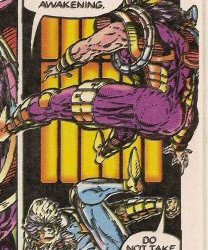
This is where I noted another little idiosyncrasy: every time Shirley does any research, he regurgitates it almost wholly undigested. Here, in an example from the prologue, he discusses the outfit of a Red Army soldier:
“Father,” Andrei whispers, in Russian, turning to look at a tall lean man in a long green coat with red epaulets, a black hat, a rifle slung over his shoulder. “Is that man one of the Red Guard?”
“in Russian” no shit
“Oh, that’s perfectly reasonable,” you may protest.
Then how about this sequence in Chapter 2, where he talks about boxers:
The talk at the crowded bar tonight was full of how Joe Louis, the Brown Bomber, back from the war with a pocketful of nothing and a big tax debt, was going to defend his world heavyweight title against Billy Conn. And how the retired Jack Johnson, first Negro to win the heavyweight champ title, had died two days before in a car accident. None of which was what Gorland needed to know.
(✿◠‿◠)ノ.❀。• *₊°。then why the fuck did you mention it ❀。• *₊°。 ❀
My chief complaint about the first set of descriptors is the list of prepositional phrases and weak adjectives and verbs. It’s a lot of talk with no power or aim. Additionally, Shirley just wrote about a dozen other people while mentioning their appearances so briefly that they might as well have been plywood standees, so a thoughtfully colorized soldier jumps out like a cat in a shitty horror film. That said, if you’re not a picky bastard, it may not bother you.
But the second one is outright incorrect. None of these historical people or subjects have anything to do with Fontaine’s current aims, nor with what he does next. It’s just there to prove that Shirley did research. If anything, it shows Shirley’s weakness: he doesn’t know how to smoothly blend research into his work.
This description is like stirring your cookie batter three times and calling it done, then spooning out a big lump of baking powder.
Shirley just put that shit in the oven.
“I just want my Irving back,” she said, her head sagging down over the drink. Lucky the song coming on the juke was a Dorsey and Sinatra crooner, soft enough he could make her out. “Jus’ wannim back.” He absentmindedly poured a couple more drinks for the sailors at her side, their white caps cocked rakishly as they argued over bar dice and tossed money at him. “What became of the unfortunate soul?” Gorland asked, pocketing the money and wiping the bar. “Lost at sea was he?” She gawped at him. “How’d you know that, you a mind reader?” Gorland winked. “A little fishy told me.”
gross
God, this paragraph is ugly and I hate it. Shirley splits the lady’s dialogue, part of which butts up against Fontaine and two sailors and causes a moment of cognitive dissonance. Shirley is ridiculously specific as to the song playing when “soft crooner” would have sufficed. The true note of interest—the data that Fontaine is sniffing out—skitters around the outsized imagery like a stupid cartoon creature.
Shirley does have a strength, and it’s in visuals. I can see and feel and smell this bar. Unfortunately, his visuals are static and progress little to nothing. Also, from what I can tell, it’s his only skill, unless causing headaches is desirable.
Also, before I leave this part, I want to clarify that there’s no problem with mentioning historical events, organizations, music, speech, people, etc, in your historical novel, and in fact you should, but if that description is at the expense of your plot, you have erred.
In any case, Fontaine asks this unfortunate caricature of womanhood what happened to her beloved. Shirley writes a long and embarrassing paragraph of dialogue that cannot end soon enough, and when it does end, it’s like this:
“Well, I went over to the place that hired him, Seaworthy Construction they was called—and they threw me out! Treated me like I was some kinda tramp! All I wanted was what was comin’ to me… I came out of South Jersey, and let me tell you, we get what we’re owed ’cause…” She went on in that vein for a while, losing the Ryan thread.
You lazy fucking bastard.
This is not the first time Shirley has ended a paragraph like this, either.

A Visual Depiction of the Dismount
Look, there are graceful ways to ease out of dialogue. Shirley doesn’t care what they are. Dialogue stands between him and a description of a “zoot-suiter [putting] a bebop number on the juke.” Do I care about that, sir? I do not. How about Andrew Ryan? How about Rapture? How about
Fontaine Shapeshift Moments Numbers 4, 5, & 6
One of Shirley’s responsibilities as writer is that he needs to illustrate the kind of person that Fontaine is. As far as I’m concerned, he’s done it several times over. It is abundantly clear that Fontaine is an asshole, and it’s clear what kind of asshole he is, even if he is kinda boring. Now that Fontaine has the Rapture thread, you would expect for him to follow that, because that’s what I’m reading this book for.
Obviously, that’s why Shirley takes Fontaine to a boxing ring! Because it is time to throw a fight! After all, we must follow up on that Great Value Mobster thread! We care so much about that! My heart throbs with anticipation! About Twitchy and Snorts!
See, Shirley did not illustrate one specific trait of Fontaine’s, and he thinks it’s important enough to digress to it: Fontaine’s ability to shapeshift, as it were.
“My name’s Lucio Fabrici,” Gorland said, tying Steele’s glove’s nice and tight. “Bianchi sent me.” … “Fabrici” had gone to great lengths for this disguise. The pinstripe suit, the toothpick stuck in the corner of his mouth, the spats, the toupee, the thin mustache—a high quality theatrical mustache carefully stuck on with spirit gum. But mostly it was his voice, just the right Little Italy intonation, and that carefully tuned facial expression that said, We’re pals, you and I, unless I have to kill you.
Wait. Was “spirit gum” called that in 1946? Oh, I don’t care.
It’s worth mentioning that I have noted two black characters so far—the boxer from the historical infodump and Steele’s trainer, who Fontaine paid to scram—and Shirley doesn’t let the trainer talk. And you know what? Given how he writes dialogue, that’s probably the safest option.
After Fontaine throws the thrown fight, he goes to his bookie operation.
[Fontaine] walked over to Morry, to have a gander at the take, and heard a couple of the dockworkers talking over their flask. “Sure, Ryan’s hiring big down there. It’s a hot ticket, pal, big paydays. But problem is—real QT stuff. Can’t talk about the job. And it’s dangerous too. Somewhere out in the North Atlantic, Iceland way…”

First of all, there’s the unnecessary description. Can’t we just assume that Fontaine walked somewhere? What does that add to the narrative? Use stronger imagery or take that shit out. That’s literally your only skill and now you’re fucking that up, too.
Second of all, split the dialogue off, why do you keep sticking it to random fucking descriptions.
Third of all, how does the entire fucking world not know what Andrew Ryan is doing? Half of what Fontaine has learned has been from overhearing random people. It’s like the whole universe is conspiring to help Fontaine out, and it’s getting a little weird, I’m gonna be honest. Every time I randomly overhear people it’s things like grocery lists and brain-dead political takes. When will I overhear where to find one million dollars
Then there’s how Fontaine reacts when he overhears this information. This sentence immediately follows the paragraph above:
[Fontaine] slipped outside by the side door and set himself to wait.
He literally says nothing to anyone. He just leaves. He’s just had an intense exposition-filled conversation with his employees and then he’s like whoops bye bitches fuck your lives
Look at how fucking pathetic this sentence is, too. “Set himself to wait”? I actually double-checked this after an edit because I was sure I’d inserted a typo. No, it’s just this bland.
This whole sequence was almost certainly written at a sprint. Words and phrases are weak as shit—no emotional power, no visual or spatial sense, no movement. There are no smooth transitions and, quite naturally, no tension. It’s just one domino falling after another. You wanna take a moment and think?
NO.
RUN BITCH.
RUN
Fontaine follows the deckhands until they reach their ship—the Olympian.
Gorland tilted his hat so the G-man wouldn’t see his face and strolled over, hands in his pockets, weaving a bit, making like he was drunk.
There’s some more embarrassing tryhard dialogue but you can read it yourself.
“Making like he was drunk.” jesus christ are you even trying
The only important part is the deckhand arguing with an officer.
“I just ain’t shipping out to that place again, and that’s all there is to it,” snarled the deckhand in the black peacoat. … “I don’t mind being on the ship—but in that hell down below, not me!” “There’s no use trying to say you’ll only take the job if you stay on the ship—it’s what Greavy says that goes! If he says you go down, you go down!” “Then you go down in my place—and you wrestle with the devil! It’s unholy, what he’s tryin’ to do down there!”
Wait. What? Why? Why is it unholy to build things under the ocean? Look, I was a religious nut for a huge portion of my life, and I can’t remember any taboos about checks notes building underwater?
As the deckhand takes off, having quit employment with Ryan Industries, Fontaine sees a piece of metal, picks it up, and runs after the deckhand.
“Hey!” the man yelped. Gorland held the deckhand firmly in place and pressed the end of the cold metal pipe to the back of his neck. “Freeze!” Gorland growled, altering his voice. He put steel and officiousness into it. … “You think I’m some crooked dock rat? I’m a federal agent! Now don’t even twitch!” [Fontaine said.]
Fontaine flashes a fake badge, then gets this deckhand to spill his guts. In two pages, he learns about Ryan building a city beneath the sea, complete with information about its technology and current state of construction.
End chapter.
Fontaine’s section of Chapter 2 runs from pages 39 through 54. In about two weeks, he has pretended to be six different people and learned everything he needs to know about Andrew Ryan.
You Can Always Try
I don’t know what Shirley was on at this point. In my mind, you devote one chapter to Fontaine at the tail-end of one really good con. Really put your effort into the con, show the ups and downs as the criminals attempt to outmaneuver the popo. Maybe show Fontaine fuck up some other criminal and then take his name. A shadow steps out of the smoke, adjusts his hat. “The name is Frank Fontaine.” Ohhhhh noooo I thought Frank Fontaine was that other guyyyy ooooooh shiiiiitttttt! And then never give out his background the rest of the story, and never show his internal world. Third-person objective: narrator stands outside of everyone. Keep Fontaine a huge question mark the entire story.
But Shirley was like, “Give Fontaine 3,000 cons in the same chapter, one after the other after the other, nonstop, don’t breathe, don’t stop, go go go go, and do it in such a way that Fontaine looks like the only human player in a world of NPCs.”
It just feels so unnecessary.
Here are images of Fontaine and Atlas.
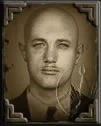
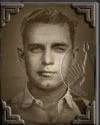
That’s called “growing your hair out” and “cosmetic surgery” you fucking dumbass. It’s not that big of a deal. Now write something I give a shit about.
Question: how couldn’t the feds get all of this information in all the same ways, plus some? This is the FBI in 1946, the USA has just gone through WW2 like gangbusters, the Cold War is just warming up, and—most terrifyingly of all—J. Edgar Hoover is the FBI director. You think they give a single shit? Hell, I’m not sure they’d have to do much in the way of skullduggery at all. So far, the biggest problem with keeping Rapture secret has been employees talking.
Long story short, now Andrew Ryan and the US government look like chumps, and the narrative has the gall to imply Fontaine is skilled when he’s just unreasonably lucky. And if there’s one rule you should never break for a BioShock story it’s to make Andrew Ryan a fucking chump.
If You Must
Although having Fontaine front and center is not ideal, it’s also doable. So far, he’s the most interesting character in the book—probably because he’s solving the Rapture mystery. There are elements he doesn’t understand, which is a kind of tension, even if there are no repercussions for failure.
This tension is accidental. Just like every other character, Fontaine’s challenges and enemies are either neutered or indistinct. He hovers in a kind of eternal limbo where he is everything he has ever been. We can’t pretend it’ll get any better from here on out. However, let’s pretend that Shirley gives a fuck.
Now that Fontaine in a traditional character-driven narrative, we need to give him an arc. The Fontaine of Chapter 2 must not be the same Fontaine we see by the end of the story. We know Shirley will fail, but that’s the standard we’re going to judge him by. Remember: this isn’t BioShock-the-game. We’re writing literature now, so the aims and methods are different. If you’re going to use him as a major antagonist, he needs challenges to surmount, same as Andrew Ryan and Bill McDonagh and every other character ever.
So if you’re going to use Fontaine in this role, he has got to have an arc of some kind. He’s got to have something to overcome or learn or become because he’s in the kind of story that calls for that.
A competent writer would give you a reason to be interested in Fontaine. Shirley knows you’ve picked up this book because you’re a fan, so he presupposes you already are. So he just… doesn’t try.
jesus christ this lazy bastard. I hold him in utter contempt.
And I am just now at Chapter Fucking Three.
<- Part 5: Three Old Men Jerking Their Milk Sticks || Back to the Beginning || Part 7: Shadow Eve ->
#bioshock#bioshock rapture#frank fontaine#writing#reading#essays#rants#long post#vvatchword#vv reading#sorry for how awkward this gets but I'm tired and done now
12 notes
·
View notes
Text
Welcome to Round 5 of The BioSurvey! This round focuses on the cast and characters of the series, and this is the fourth poll of the round:
Note: This list is based on minor characters with multiple accuvox/audio diary entries.
2 notes
·
View notes
Text
The Tortoise The Hare
The Tortoise The Hare
by THATBITCHPOCA
Words: 97, Chapters: 1/?, Language: English
Fandoms: Naruto, Konjiki no Gash!! | Zatch Bell!, Metal Gear, Dragon Ball, Mortal Kombat (Video Games), Devil May Cry, Final Fantasy VII Remake (Video Game 2020), Tarzan (Disney Animated Movies), Atlantis: The Lost Empire (Disney Movies), Cyberpunk 2077 (Video Game), Ghost of Tsushima (Video Game), BioShock Infinite, Batman: Arkham (Video Games), The Legend of Zelda: Breath of the Wild, The Dark Pictures: House of Ashes (Video Game), Grand Theft Auto: San Andreas, Spider-Man (Video Games 2018-2020), Superman - All Media Types, Street Fighter
Rating: Not Rated
Warnings: Creator Chose Not To Use Archive Warnings
Categories: M/M
Relationships: Nuova Shenron/Son Goku, Sephiroth/Cloud Strife, Cell/Janemba (Dragon Ball), Fujin/Nightwolf (Mortal Kombat), Omoi/Uchiha Shisui, Kazuhira Miller/Venom Snake, Tarzan/Milo Thatch (Disney), Link/Prince Sidon, Jason Kolchek/Nick Kay, Clark Kent/Miles Morales, Jason Todd/Booker DeWitt, Nero/Tseng, Super Buu/Future Trunks, Shunjinko/Hotaru, Goro Takemura/Jin Sakai, Carl "CJ" Johnson/Noctis Lucis Caelum, Hearts/Raditz, Brago/Danny Boy, Luke Sullivan/Jamie Siu, Son Gohan/Jade
Additional Tags: Trans Male Character, Alternate Universe - Modern Setting, Aged-Up Character(s), Interracial Relationship, Established Relationship
From https://ift.tt/DWU89lH https://archiveofourown.org/works/45403225
4 notes
·
View notes
Text
I was gonna mention how beautiful the song Kinda Lonesome by Maxine Sullivan was because I’m a sucker for vintage jazz especially when it has a slow dance tone and was about to search it up on Tumblr to find the few blogs that might have known it. Then I misspelled it as lindalonesome.
Linda Lonesome.
Sounded like some cutesy persona that’s romanticizing, well, loneliness. Or the sad version of the Little Miss books - the alliteration and alphabetical order just had me thinking of it. Linda Lonesome.
Sounded like a name I would use on my own BoJack sitcom looking back and feeling depressed about it…okay, I would not say the concepts and stories are similar but the name is just getting to me.
Random misspellings can make you think.
Edit: This would work perfectly in the BioShock soundtrack. Fallout also popped into my head but I personally prefer it for BioShock.
youtube
#random thoughts#kinda lonesome#maxine sullivan#names#bed thoughts#jazz#jazz music#slow dancing#Youtube
1 note
·
View note
Text
Me reading the BioShock novel and reaching the point of Sullivan's suicide thinking, ah he has seen the error of his ways and how shitty Andrew Ryan is, and then reading about him ratting on Jasmine in his SUICIDE NOTE to a man he has supposedly lost all respect or loyalty to: once a cop bastard always a cop bastard I guess!
#fuck you! any marginal sympathy i might have felt is gone#and there wasn't a lot of that anyway#if you were going to kill yourself why not do it BEFORE killing anna culpepper instead of after#or better yet JUST NOT DO IT#KILL RYAN YOU FUCK#ugh#suicide tw
1 note
·
View note
Note
Love your Bioshock stims, especially Bill's! Would you kindly do one for Sullivan?
here ya go!! i'm glad you like the other ones, and i hope you like this one :D
#scopo's mail#the nature of being the bioshock stim guy is getting wyk'd in the inbox /silly#i think it's very fitting i enjoy it#also dubbing myself bioshock stim guy like its a brand. i think i can do that after so many boards hehehe
2 notes
·
View notes
Text

101 notes
·
View notes
Text
Doodles

Just some doodles of some barely drawn characters for @atlas-slut-of-the-people I did today ✨️
40 notes
·
View notes
Text
Reading BioShock: Rapture (Part 3: The Prologue’s Prologue)
<- Part 2: John Shirley and the Front Matter || Back to the Beginning || Part 4: Going Down ->
And so I begin with the prologue—at long last.
Oddly, despite the trash fire that is everything else, it starts out perfectly fine:
Sullivan, chief of security, found the Great Man standing in front of the enormous window in his corporate office. The boss was silhouetted against city lights. The only other illumination was from a green-shaded lamp on the big glass-topped desk across the room, so that the Great Man was mostly in shadow, hands in the pockets of his crisply tailored suit jacket as he gazed broodingly out at the skyline. It was eight o’clock, and Chief Sullivan, a tired middle-aged man in a rain-dampened suit, badly wanted to go home, kick off his shoes, and listen to the fight on the radio.
Mmmm. Mmmmmmmm
I do like this
I have talked much shit but this is a good start. This is how a BioShock story should start: with The Man Upstairs Himself, Andrew Ryan. Chief Sullivan’s POV—displayed here in third person-limited—is a great choice as well. It leaves Ryan a little more mysterious and less defined, which I like. I think that keeping a character like Ryan mysterious is more akin to the dialogue we’d get during gameplay. We can’t see Ryan’s interior self; we see what he chooses to present to us. And if we have any flaws as human beings, it’s that we assume people are more put together than they actually are, so this is an excellent choice. Don’t ever give your reader a sense of his weakness. Just show him rollin (we hatin)
The two top paragraphs give an excellent sense of his standing and wealth (a chief of security at his beck and call from his ritzy upstairs office somewhere on Fifth Avenue, NYC). There are some factual and historical elements here worth looking up revolving around the locale: what kind of skyline you could see from what part of Fifth Avenue, mostly. For example, what’s the best area of the city to choose so Ryan isn’t just looking out his window at another window? Simultaneously, not every skyscraper or building on Fifth Avenue is going to be ideal for both business and skygazing.
That said, this is relatively simple to handwave away with just the barest knowledge of the area (Sachs! Fifth Avenue!), and I don’t know what kinds of businesses or buildings were typically present. At least this sounds right. (Note from Future Me: do not trust him. He is a hack. He didn’t even use Wikipedia. NOT EVEN WIKIPEDIA)
All of this dialogue is going on during a Dark and Stormy Night, so I spy a little of BioShock’s inherent camp as well, and I approve. Characterization is shown through a combination of body language and inner desires. We have a great feel for Sullivan as a workaday man and his awe of Ryan works perfectly. Very nice. Mwah.
What did I hate about this? This is fine. I mean, I guess it’s a little over-the-top on description, and there’s an ugly little adverb in there, but that’s not so bad. It’s not so ugly that it’s awkward.
Coincidentally, I heard that Ken Levine worked on some pieces for the novel. Several articles mention a “foreword.” Others mention that he was supposed to write a prologue and an epilogue. However, he’s not mentioned as a cowriter, and my version—a first-edition paperback—doesn’t have a foreword. We’ll have to presume everything is John Shirley until it is confirmed otherwise.
Yet sometimes it seemed the tycoon was casting about for a friend he could take to heart.
Oh.
No,,,,
noooooo, no. No,,,,,,,,,
Wrong. Bad. Wrong. Incorrect.
Showing versus Telling
This story goes from letting the mood and dialogue speak for itself to Telling almost immediately. For a brief, blissful second you’re really leaning into Chief Sullivan and then Andrew “Friendship Is Magic” Ryan happens in paragraph three. It’s like Shirley said, “SHIT, I forgot to mention he’s lonely,” and instead of finding a good place to show it, he just shoved a paragraph in there. “There! Done!” slams back wild turkey
So. Showing versus Telling. Writers yell about this a lot, especially the mantra: “Don’t Tell! Show!”
In other words, show the character feeling lonely. Don’t outright say he’s lonely.
Now, Telling has got its uses, whatever anyone says. That said, when it comes to character growth, you try everything in your power not to “Tell.”
This phrase. “Casting about for a friend.” Why is this here. Where did this come from. How does it feel. It literally pops out of nowhere, inspired by nothing. (Equally important is that every subject leads seamlessly into the next.)
Does Ryan seem like he needs a friend? Is that the main point of the scene? No, the point of the scene is Ryan’s political stance and forceful personality. You don’t need to explain every fucking theme at once, it’s okay. Like maybe start with the forceful Big Boss shit and then Ryan goes home and he’s like :( boy it sure is lonely round these parts.
In fact, that would be a great contrast, wouldn’t it?
Imagine this: a scene of the big bad boss man ordering his chief of security to beat the shit out of some strikers in Kentucky. Then show him getting into a nice car by himself. Show him eating dinner at a nice restaurant across from an empty chair, surrounded by diners who all have friends and beloveds at hand. (Show this against a mirror or window. He is not even looking at his reflection.) Show him leaving by himself; he heads to his fine penthouse apartment by himself. Show his driver and doorman as nonentities. Show him surrounded by quiet servants who quietly serve him and quietly leave until he’s sitting by himself with a glass of merlot. Maybe he has a newspaper or a radio sitting next to him. Emphasize that silence and the vast spaces around him.
If you must explicitly mention loneliness, I’d recommend Ryan talking like no one’s on his level. He probably thinks he’s too good for other people, and it’s possible his autism/BPD/trauma is so powerful that he’s on a separate plane of existence. Most Randian Ubermensch are.
Another issue with “Telling” is that it tends to flatten characters out. They become grocery lists of traits. And Ryan should not ever, ever be flattened. He should rise above you like a thunderhead. Do not steal his mystique—that’s literally the most important facet of his character. I’m sure there’s a way to “Tell” that he’s lonely, but this is not the right place or time, and this sounds like he’s a little girl listing all alone in a playground instead of a big bad boss man who sends strikebreakers to fuck people up.
I’m Sorry to Report to You
Ryan asks Sullivan for his two reports.
“Let’s have the report on the strikes first, get it out of the way. The other one…” He shook his head. “That’ll be like hiding from a hurricane in a cellar. We’ll have to dig the cellar first, so to speak…”
what
I’m assuming this line means, “A cellar is inadequate for a hurricane. Therefore I need to build a cellar for the oncoming hurricane.” Which makes. No goddamn sense.
But I also have no experience with hurricanes. To make certain I was not missing some finer point, I went to a friend who has lived in the hurricane lands and asked her questions.
watchword — Today at 6:22 PM FRIEND. I have a hurricane question for you. "That'll be like hiding from a hurricane in a cellar." What does that mean to you To me, it implies that a cellar wouldn't be enough. Admittedly, I've never lived in hurricane country
Salty — Today at 6:23 PM It's very silly, tbh Hurricanes are multi-day affairs And usually we don't have cellars in hurricane country
watchword — Today at 6:23 PM Is this a saying that you know of? Guess where I read it
Salty — Today at 6:23 PM LOL It's not a saying I know, but I can guess that someone confused a tornado with a hurricane
watchword — Today at 6:24 PM I have always gone into cellars for tornadoes what the fuck
Salty — Today at 6:24 PM Hurricanes are like big multi-day thunderstorms, and usually on the coast, the water table is too high to have a cellar or basement
(I found out all of this under two minutes john)
Long story short, this sentence does not make any goddamn sense and it’s the second thing that Andrew Ryan says.
Sullivan wondered what he meant by that cellar remark, but he let it go.
NO. Sullivan do not let him go. Ask him what the fuck that even means. Sullivan? You must kill him sullivan
Instead of killing him, Sullivan tells him about strikes.
“The strikes—they’re still going on at the Kentucky mines and the Mississippi refinery.”
Okay there are two jarring problems here.
First is the specificity. Consider this: these are two adult men, both professionals, both competent in their respective fields, and they are speaking about a situation that has been ongoing for a while. This is a report that Ryan expects, and the implication is that there have been others.
One would expect for Sullivan to have a far more specific insight into the situation—perhaps big players on all sides, perhaps a list of demands from the strikers, perhaps some talk about national, state, or city politics or site layout and all the ways they affect progress. Moreover, when strikes occur, they are often referred to by the name of the city and company they’re part of, and it makes sense that Ryan would have an idea of his facilities and where they are in the country.
Long story short, proper names would be rattled off left and right, stakes and states would be presupposed or mentioned offhand, and both Ryan and Sullivan would know what they were immediately.
Second, the phrasing is so juvenile that it’s cringe-worthy. This sounds like what a high-school student thinks that businessfolk sound like. “They’re still going on” is such a nothing sentence. Under what circumstances? Sullivan would know what circumstances and he’d start out right where they left off the last time.
If I put myself in my CEO shoes, “they’re still going on” is not something I’d wait up to hear. I’d be like bitch I know, have they been able to ship the scabs in? How about the Elizabethtown situation? How many more did that Pinkerton bastard say he needed? All right. How much? He said he could do it with $XXXX; why hasn’t he managed it? Did they at least take care of that Mulligan man? Why not? jesus christ is everyone a fucking Red-tit-sucking bastard? What do you mean the mayor wants a payoff? What is this, Ukraine?
Except I’d not say “Ukraine,” I’d go look up first-hand accounts and experiences with famously corrupt governments in the Soviet bloc between years 1930 and 1946 that Ryan may have had personal experience with and just replace “Ukraine” with some important city somewhere with a tiny off-hand note that makes it sound like Ryan knows his shit. I probably wouldn’t swear that much, either—Ryan is classy until he’s been pushed to the edge.
But this is just a first draft, too. This is just me making shit up in literally 10 seconds. You come in later and you smooth that shit out. You look up where mines are located in Kentucky, where refineries were most likely to be located in Mississippi, and you might look up what kind of products they make and staff they’d employ at those locations in 1945. Look for pictures and firsthand accounts of related strikes at the time and double-check if the Pinkertons were even still a thing in 1945. Extrapolate, steal, remix, and you’re golden.
Also? This is wartime. Not only was production a completely different monster, businesses were under the heel of the US government at this time. Interesting historical note: most unions had pledged not to strike. In 1943, coal miners were like fuck you, pay me, and a strike began. The government responded by nationalizing all coal mines and threatening to send in troops as strikebreakers. When nationalization and the threat of violence didn’t work, President Roosevelt’s next response was to fucking criminalize striking in war plants or nationalized industries.
Did the coal miners care?
lol no
And so labor gains were made during an unlikely period.
I found this out in 30 seconds of searching from a quality source at the US Archives. Usually I look for at least two separate accounts of the same event just to make sure I haven’t stumbled on some goofery, as well as read documents both primary and otherwise, but if you’re short on time, a .gov website does nicely.
Why Are You Like This Again
Technically, Shirley is overcoming a problem here: he needs to communicate the kind of person that Andrew Ryan is, what Ryan is like in business, and Ryan’s political viewpoints. He doesn’t want to get locked up in meaningless minutiae. Of course, rattling off exact names is a great way to bluff your way out of a situation like this—to look like everything is business as usual, and imply you know more than you do. Despite writing more books than the Bible, Shirley does not know how to do this.
This is that pandering to the lowest-common denominator that I was telling you about. Shirley cannot trust the reader to know anything about the time period, the work of a company president (I’m not using “CEO” because this term was coined in 1984—neat), or anything beyond the most basic comprehension of wartime, unions, and strikes.
I just realized that Shirley is also the lowest-common denominator so good news for all the low-coms out there.
There’s a simple solution, of course: have the strikes be brand new. Then Sullivan would have to share explicit details about what’s going on, since Ryan would be equally new to the situation. There would still be some shorthand in their speech to experiences they’ve had outside of this one, but it would be easy this way. Then you can mention everything by name (“Our mines in Martin County!”) for the benefit of the reader.
The eagle-eyed reader will have noted: yes, that would be easy! but it would also take work. What if u are tired. What if u r unmotivate. Wat if
rather toke
puff puff
Of course, there are ways to ease the reader into these subjects. We’re approaching this work as a standalone, remember? This is one of the strengths of literature—the ability to explain complex subjects in-narrative by bouncing off of other intangible subjects.
Your reader doesn’t have to know everything, but the dialogue should be immediately understandable to them by context alone. And it’s totally doable! I’ve done it! Because you have to do it with all subjects when you’re writing, not just historical concepts! If you’re a writer you’ve probably done it without thinking about it!
Basically, you lead the reader in with easy concepts, then build on that simple foundation with more and more complex ideas. It takes some work and thought, but it’s also fun and interesting and is a great educational opportunity for both you and your reader. I can’t believe I’m writing this
Touchy-Feely
Here’s the problem.
I said in the last installment that I suspected I’d see quick, undigested concepts. I did not guess that Shirley would opt to do NOTHING. No research, not even badly. He didn’t even look at a map. He’s almost purely visual, and in the worst way: he bases his scenes on how he feels about the 20,000 movies he’s seen and conflated in his brain.
I now suspect that he is the kind of writer one is in childhood: the kind who writes solely by feeling. This can be done, and can be done well, but it is also hit-and-miss because you’re not sure WHY you’re doing what you’re doing. This probably explains why he could win an award: because he wrote with his whole dong at some point, took for granted he would be Great Forever, and got complacent.
Because Shirley isn’t here to write about a concept. No, he doesn’t have a concept to explain at all. He writes blindly, with his little feelers bipping and bopping all over. He is a pillbug with Microsoft Word and an internet connection.

Black Butterflies is in two parts: eight stories set in "This World" (what we call reality) and eight stories set in "That World" (where the door swings open into the realm of the surreal, the supernatural). In "This World" we meet a middle-class white woman who turns a mugging by two black youngsters into her chance to pursue glory as a criminal; a cop who knows his partner is guilty of murdering his wife; two hustlers who throw a sadistic and drug-infested party at the expense of their bound and unwilling host (believe it or not, it's hilarious); "a girl who died from cum"; and two bike messengers whose fate is to join hundreds of other people in a freak accident so... —Summary of Black Butterflies by John Shirley on Amazon
This seems pretty cool, actually. I might actually rea
wait
she died from what
Well now I’m definitely reading it. Although I’d bet money it’s edgy 90s bullshit.
You Should Be Ashamed
Shirley just wanted an approximation of Business Men having a Business Talk. He doesn’t take a step back and say, “Ah! I should know what an oil tycoon might talk about to his chief of security in midcentury America. In which case: I should know how the oil business works, I should know what a security officer does, I should know what company presidents do in case of a strike… oh, and I need to introduce some themes: the loneliness of being a great man, the kinds of people Andrew Ryan would surround himself with, Andrew Ryan’s politics…”
In his mind, he sees that scene he’s seen a hundred times before—the one where the lackey has not done enough, and then the Big Businessman says, “You’ve let me down, lackey!” And the Lackey, satisfactorily stung, murmurs: “I will do better, sir.”
But he doesn’t know why he needs it, so it all comes across as nonsense. It’s just the random babbling of a theme generator. This is like AI writing. I mean if you care that little just go into a book published in like, 1940, and steal the dialogue out of that. Nobody reads anyway, just be a bastard, jesus christ. I mean I’ll still hate you but…
I can’t believe this is where I’m at right now: debating myself whether it’s more or less ethical that he did nothing because he didn’t care or was too lazy to steal. I suppose it’s possible that he’s not lazy, just incompetent, but that’s even worse somehow.
He was paid. He was paid to do this. This is ultimate “have the confidence of a mediocre white man” energy.
Long story short, you don’t have to care terribly much to do this right. I did all of the research above in less than an hour, and it’s been a minute since I’ve read up on wartime industry. I’d be embarrassed to end it there, but there are little ways to cut corners that don’t make you look like a fucking jerk.
At this moment, I feel like I can say, with absolute confidence, with curled lip and disdainful eye, that this wasn’t done right. It wasn’t even done. Shirley didn’t do even a modicum of research. Not even to look up a couple of random towns in a couple of random states. Not even to straight-up invent them.
I’ll just say it: pathetic.
Parasite Expectations
If I spent any time going over all of the dialogue here, I’d end up sharing the contents of the entire page, and I think that is frowned upon in copyright law. However, if I told you everything was wrong, would you believe me? All of the same problems apply: juvenile speech patterns, a lack of specificity everywhere that matters, and constant Telling.
Oh! And a new problem rears its lopsided head: weird fucking tangents. There is a random aside to the shoulder padding in Ryan’s jacket for no reason. I think it’s supposed to give you a material sense of the different era? It’s weird though, and it occurs after unrelated dialogue. It’s akin to those novels where the character gets out of bed and looks in the mirror at her blue orbs.
Note to would-be historical novelists: read midcentury novels and note what jumps out at you as old. Everything sounds pretty much the same as today except no one has computers or cell phones, and there’s some problem-solving that revolves around that, but all you have to do is confer with the Olds in your life if you’re uncertain. Every now and then someone mentions snapping a garter or there’s a random mention of typewriters or talking to a phone operator. Oh, and everyone wears a hat. And it’s rarely a specific hat, it’s just “hat.” Because usually people don’t think twice about the mundane bullshit they have to do until they have to do it, and knowing when to be specific is its own art.
Just fucking read ok. Don’t be a Shirley. He clearly hasn’t read anything in his life.
Buzzwords
After Sullivan shares the poor man’s version of a “But I twied to stwikebweak them, Mr. Wyan,” Ryan says at one point:
“Have you been out there in person? Did you go to Kentucky—or Mississippi, Chief? Hm? You need not await permission from me to take personal action—not on this!"
What is Sullivan supposed to fucking do, run out there and start beating people with a stick?
A new misfortune has arisen: now it’s clear to me that Shirley doesn’t know what Sullivan’s job entails.
I could tell you how this kind of research works but at this point I’m just fucking horrified. This is unbelievable. If you don’t know what a job is like, research it. Have you done it? Oh of course not, you’re a lazy-ass bastard and you have more confidence than capability. But let’s say you give a shit!
Now take your little notepad out, write down all the details you can’t answer, list them in order of importance, and then research them. That’s how it works. There are people on AO3 taking college classes to understand sign language or research historical periods for fanfiction only 20 people will ever read. Tor and 2K paid this man to regurgitate half-baked movie sequences that he couldn’t be arsed to look at a map for.
And it’s even worse than that, somehow. He didn’t just not research. He didn’t even make something up! He didn’t say to himself, “What does a security officer do? Uhhh from my extensive viewings of Die Hard:” and then just invent shit. He just did nothing.
Not only is this nothing like real life, this isn’t a scene as it would exist in a film. It’s merely film-like. It’s the undigested impression of a sequence. It’s the shadow on the cave wall. It’s the writer equivalent of nearsightedness.
Now, if Shirley had been specific, we would be able to say exactly what Sullivan ought to do. But we have no idea what is even happening. Shirley should have asked how strikes work, and what kinds of things a security officer with no moral compass might get up to, and what kinds of vengeance a tycoon might wreak, among many other things. But Shirley does not know. Nor does he care. And besides, it’s just so much fucking work and he’s got to go Geezer Scream at a dive bar for the dead.
Most importantly, this dialogue doesn’t reflect well on Sullivan and it doesn’t reflect well on Ryan. They are not only pretending to be a Chief of Security and a company president, they are pretending to be human beings. Also, both of them now look weak as balls. I am confident I could beat both of them to death at the same time with my bare fists and I am a bag of juice.
Ryan continues:
“Unions… they had their own little army in Russia—they called them Workers Militias. Do you know who these strikers are? They are agents of the Reds, Sullivan! Soviet agents! And what is it they demand? Why, better wages and work conditions.”
I had a history class too. Did this guy share literally anything that he hadn’t heard offhand once? Has he ever opened a book just to learn something?
In any case. This. This is where I knew I was going to hate this book forever. This paragraph sounds like a joke. Is this what Shirley thinks satire is? I’m going to kill myself.
This is the paragraph that settled the back cover summary’s authorship for me. This is the paragraph where I realized, “John Shirley does not understand Objectivism or Andrew Ryan, nor the appeal of either.”
Perhaps this is a great place to work in another aside. Do you like asides? No? Fuck you.
Aside #330,80085,5420695.52
So! Back in the day there was this commentator for Fox News called Charles Krauthammer. He was a legitimately intelligent and capable man and a Pulitzer Prize winner. Fox would set him on a panel with three babies and it was like night and day. The babies with their perfumed cheeks and platinum blow-outs would share their shower thoughts, which were mostly buzzwords and half-digested anger.
Then Krauthammer would start speaking and you felt like there was a miscarriage of justice. How did these three other losers get on this panel? Send them back to fucking preschool. He had this vision of cause and effect over time that the babies were too young and poorly-educated to see. He was connecting dots to universes only he could show you. Like are there more of this man? If there were, leftists would be in trouble.
Conservatives loved this guy because they all suffer from this niggling terror they are all actually very dumb, and it wounds them that intelligentsia tend toward liberal doctrines. But if Krauthammer was smart that meant they were actually smart! (this is its own stupid bullshit but it’s all they have. god bless them. having your head permanently stuck up your ass is difficult work)
I thought about going back to listen to some old Fox News shit for this but I decided to pull a Shirley. I am forced to listen to Fox News every day now and I can’t stand it. It’s probably not what I remember. I liked Krauthammer back when I was a conservative, but I have also been an idiot for most of my life. It is probable that I still am. An idiot, I mean. Look at me NOW. Picking up pennies, gasping for breath in an airtight room, writing this shit for three people and about 10,000 bots. Feed this shit into your AI algorithm and get fucked.
Now.
This Andrew Ryan is spouting shower thoughts. This is not Krauthammer behavior. It’s not even Randian behavior—and like it or not, she was intelligent, in her own way.
But Shirley’s Andrew Ryan is not an intelligent man. This is not a Pulitzer Prize winner. You can tell because all he utters are buzzwords, and the buzzwords are expected to do all the heavy lifting.
Does BioShock’s Andrew Ryan utter buzzwords? Sure, to expand on concepts. Look at some of his dialogue from the game:
Gregory, don't come whining to me about market forces. And don't expect me to punish citizens for showing a little initiative. If you don't like what Fontaine is doing, well, I suggest you find a way to offer a better product. —“Offer a Better Product,” BioShock
What is the buzzword? “Market forces.” Ryan mentions the market forces, then builds on his ideas of what ideal market forces are. This is also a great baseline for his character. He hates Frank Fontaine. He has known Fontaine is bad news for a long time. He will not stop Fontaine for his success alone.
On the surface, the Parasite expects the doctor to heal them for free, the farmer to feed them out of charity. How little they differ from the pervert who prowls the streets, looking for a victim he can ravish for his grotesque amusement. —“Parasite Expectations,” BioShock
What is the buzzword? “Parasite.” “Parasite” has a specific meaning in Objectivist parlance, as well as BioShock's, and it’s something that Ken Levine built on over time.
Your first thought when you heard this, as a sane person, was to reject it. Levine knew you would reject it. He wants you to hit that cognitive dissonance and wriggle in your seat. He wants you to think.
This audio diary is an expansion on the concept of the parasite. What other parasites are in game, literally and figuratively? What is parasitic behavior? Is this really parasitic behavior? What are the differences between your definitions of “parasitic” and Andrew Ryan’s?
Just because I hate you, here is some shit from Atlas Shrugged:
“Who is John Galt?” The light was ebbing, and Eddie Willers could not distinguish the bum’s face. The bum had said it simply, without expression. But from the sunset far at the end of the street, yellow glints caught his eyes, and the eyes looked straight at Eddie Willers, mocking and still—as if the question had been addressed to the causeless uneasiness within him. “Why did you say that?” asked Eddie Willers, his voice tense. —Atlas Shrugged, Ayn Rand
Throughout Atlas Shrugged, Rand uses “John Galt” as a touchstone. She creates a buzzword, and she expands on it over and over and over. There are over 500,000 words of expansion in this shit. She does not tell you why it’s important. She introduces a sensation of unease and hints that the name is everything.
She does not do as Shirley does here:
“[Buzzword]… they had their own little army in Russia—they called them [Buzzword]. Do you know who these [buzzword] are? They are agents of the [buzzword], Sullivan! [Buzzwords]! And what is it they demand? Why, [buzzwords] and [buzzwords].”
Using a single word or phrase to carry a world of meaning is a fucking privilege, not a right. You must earn it. And if Ayn Rand is kicking your ass you need to rethink your work strategy.
Did You Want the Second Report or
Ryan wants that second report:
“And—the other report? It’s true, isn’t it?” “Both cities are almost entirely destroyed. One bomb apiece.” … “Our man in the State Department smuggled this out for us.”
And then Sullivan gets him some nice glossy photographs. thanks sullivan. u could have killed him sullivan. this could have been short sullivan
This is a rare case of John Shirley doing research.
First of all, photos of nuclear destruction didn’t get out for some time. You can confirm this by looking at the front pages of newspapers. Reporting on the disasters occurred nearly simultaneously in the Western world, but newspapers of the day didn’t have images—Japan was closed to outsiders—so they used drawings and stock art to depict related subjects (the pilots responsible and the plane used, for example) or what they thought the destruction might be like (by quick artistic rendition) or political comics (“fuck u because Pearl Harbor”). Immediate images of the destruction do exist, but it took them a while to get out, and there was also some good old-fashioned censorship (USA! USA!). If you want a good jumping-off point, the Wikipedia article shares a few bite-sized nuggets.
Secondly, reports of radiation sickness—and concepts of atomization itself—were not really in the public consciousness at this point. Nor were they reported until at least a month later.
So yeah, it makes sense that if Ryan wanted to see real pictures and get information he could trust, he’d lean on his power and prestige to get them—it's a great illustration of both, as well. But none of this is explained or implied in any effective way, and I was already deeply suspicious of Shirley, so my very first thought was, “You mean………. the second report…….. was the fucking newspaper”
The part of this that irks me is how many times Andrew Ryan turns to Sullivan for his opinion. I feel like this is wrong and I can’t put a finger on it. I truly don't think he'd ask Sullivan for his opinion except in a hypothetical sense, and I don't think he'd broadcast his mood. My idea of Andrew Ryan is as someone who is extremely controlled. But BSR's Ryan is unpleasantly soft and too obviously unsettled. Why does he care?
I ask this because Randian Ubermensch do not give a single shit about what anyone ever thinks, ever. This is not to say that we should strip Ryan’s humanity away like Rand does, but there’s a way to do it effectively. I know this is true because Ken Levine did it and because I have been the kind of person who understands this particular brain rot.
In any case: this gives us a literal date for this sequence. It would have to be after August 9, 1945, when Hiroshima was wiped off the map, and before images got out (I didn’t look ahead far enough to see who got first dibs because that's not my job). So why wasn’t an exact date given on the front page? Because the first page just says “1945.” Why not “August 10, 1945” or “August 1945”? Like if you’re giving the date give the whole-ass date. Are you afraid of commitment john shirley
Before we go on, look at this. LOOK AT THIS
The Great Man held the glossy photographs to the window so he could make them out in the twinkling light of the skyline.
Shirley is so sold to this image of a silhouette against a skyline that he makes Andrew Ryan try to look at pictures with the light from someone else’s window 17 miles away.
THERE’S A LAMP RIGHT BEHIND HIM. THERE’S A LAMP. DO YOU REMEMBER THE FUCKING LA
I Have to Stop Now
I have been trying to keep these posts under 3,000 words. Every single one has hit 6,000. There is something remarkably cursed about all of this.
I think I’ll start stretching out and covering larger swathes of text eventually. We’re basically setting a baseline: for what kind of writer John Shirley is, for what kinds of flaws he is cursed by, for what kind of work he’s willing to do or cognizant of or whatever.
Look guys. I’m on page 3. It’ll get less dense from here on out. I promise.
At least I am getting a foot up on my own research, right?
right?
kill me
<- Part 2: John Shirley and the Front Matter || Back to the Beginning || Part 4: Going Down ->
#bioshock#bioshock rapture#andrew ryan#writing#rants#essays#objectivism#atlas shrugged#vvatchword#this is a long post gentlefolks#click it and it will evaporate your timeline#u have been warned#vv reading#'the first scene u see should not be the one where u have given up'#long post
7 notes
·
View notes
Text
Bioshock Rapture Novel

73 notes
·
View notes
Photo










Bioshock: Audio Diary pictures (Part 2)
#bored#bioshock#rapture#bill mcdonagh#sullivan#anna culpepper#peach wilkins#kyle fitzpatrick#silas cobb#hector rodriguez#martin finnegan#kyburz#pablo navarro#video game#videogame
30 notes
·
View notes
Video
youtube
I’m probably going to sleep early tonight, so no rping, but I do want to say this is definitely Sal’s voice claim.
3 notes
·
View notes